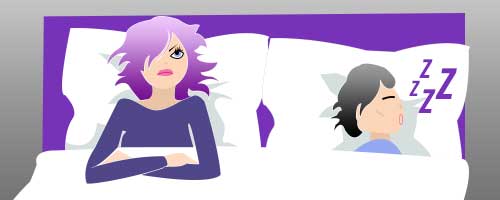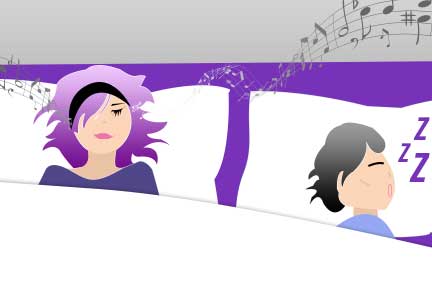How to Sleep Next to Someone with Sleep Apnea

partner eager to learn how to sleep next to someone with sleep apnea
If you're sleeping next to someone with sleep apnea, getting some uninterrupted z's can be a challenge. Whether this person is a roommate or a significant other, bedtime can quickly become a point of contention when sleep apnea is in the picture.
To help increase the quality and quantity of your sleep, AcousticSheep, makers of SleepPhones® headband headphones, highlights five tips for sleeping next to someone with sleep apnea. Beforehand, we'll briefly review what sleep apnea is and discuss how interrupted sleep can impact your health and relationships.
Medical Disclaimer: The content on this page is strictly for educational purposes. You should not regard it as medical advice. Always consult your doctor before taking any new medication, changing your current dosage, or making other significant lifestyle changes.
What is Sleep Apnea?
Sleep apnea is an increasingly common and potentially serious condition that causes abnormal breathing during sleep. Apnea occurs when the upper airway becomes repeatedly blocked during sleep, reducing airflow.
These temporary lapses in breathing lower sleep quality and cause loud snoring (sometimes even choking sounds). Common sleep apnea treatments include breathing devices such as continuous positive air pressure (CPAP) machines and lifestyle changes.
There are three types of sleep apnea:
- Obstructive Sleep Apnea (OSA)
- Central Sleep Apnea (CSA)
- Mixed Sleep Apnea
How Sleep Apnea Can Impact Your Health and Relationships
Sleeping with a snorer can take a significant toll on your health and do damage to a relationship. A study from the Mayo Clinic found that spouses of snorers woke up (at least partially) an average of 21 times an hour!
Because of this constantly interrupted sleep, people with significant others who snore typically have higher levels of daytime fatigue. A partner of someone with sleep apnea may even be at a higher risk of hearing loss.
But it's not just physical health that suffers; it's the health of the relationship. Sleep deprivation can make romantic partners feel unappreciated. It may also rob relationships of their intimacy.
A study published in The Journal of Sexual Medicine which focused on the link between sleep apnea and sexual dysfunction found that 70 percent of participants also experienced erectile dysfunction. Likewise, researchers also found that sexual function in females with sleep apnea was similarly negatively affected compared to those without sleep apnea.
Six Tips for Sleeping Next to Someone with Sleep Apnea
The bottom line is, when your partner or roommate's sleep apnea is under control, you both enjoy the benefits. Research shows that the elimination of snoring resulted in improved sleep efficiency and continuity. These improvements translated into an additional 62 minutes of sleep per night for spouses of snorers with sleep apnea. Thankfully, there are various actions you can take to ensure both of you are sleeping soundly and your relationship remains intact.
1. Support the Use of a CPAP or Dental Appliance
Many people with sleep apnea are self-conscious about using a continuous positive airway pressure (CPAP) machine or dental appliance. These feelings seem to be more true for men in newer relationships.
The best move is to talk about the issue. If it's your roommate who is snoring, let them know how it's impacting your sleep. You might find that they have no idea it's even an issue.
If it's your partner, encourage their use of a CPAP if they need it and eliminate any concern about it not being "sexy." Also, be patient with them as they get used to this new treatment.
2. Exercise Together
Being overweight puts people at significant risk for sleep apnea. If your partner or roommate needs to make lifestyle changes, try to make these changes with them. As a bonus, research even shows that couples who workout together experience higher relationship satisfaction.
It can also be helpful to cook together. Encourage each other to avoid fatty, sugary, and processed foods. This encouragement is especially vital when it comes to food and drinks before bed.
3. Reduce Food and Drinks Before Bed
When a person eliminates food a few hours before bedtime, it can make a huge difference in snoring frequency. While bedtime snacks such as fruit, peanut butter, or yogurt are okay, heavy meals should be off limits.
Similarly, a glass of red wine may help improve your sleep, but consuming multiple alcoholic beverages before bed increases the risk of snoring due to alcohol's muscle-relaxing effects. As a person's throat muscles relax, the air passage in the esophagus constricts, and snoring ensues. To help you and your partner or roomie get a better night's rest, remind your person to ease up on the beer, booze, and wine before bed.
If your roommate or significant other is dealing with some FOMO (fear of missing out), you should consider avoiding late-night snacks and alcohol as well. You'll probably notice a few benefits from making this change, too, such as weight loss, better sleep, and reduced heartburn.
4. Give a Side-Sleep Reminder
There are a variety of benefits that are correlated with sleeping on one's side. With the right mattress and pillow, it can reduce back pain, heartburn, and perhaps most importantly, snoring. So, when you start hearing your roommate or significant other sawing logs, gently remind them to sleep on their side.
By switching positions, they'll open their airway and breathe easier. Many physicians recommend people with sleep apnea sleep on their sides to alleviate symptoms.
5. Mask the Snoring Sounds

using headband headphones to help mask the sounds of snoring
Getting used to a CPAP machine or making lifestyle changes won't happen overnight. For that reason, it can be helpful to take charge of your sleep and invest in a way of masking snoring sounds.
One solution is classic earplugs to block out outside noise. However, jamming these little pieces of foam or plastic into your ears and then keeping them there all night can be uncomfortable.
An excellent alternative is SleepPhones, headphones specifically designed for sleep. Not only are they comfortable, but they're also versatile. In combination with listening to your favorite white noise or sleep sounds, the soft headband doubles as a sleep mask.
It's a small investment that can make a massive difference. One SleepPhones customer said, "[SleepPhones are] the only reason my husband and I are still married! Best investment ever!"
Another SleepPhones customer mentioned, "I use these every night. My husband snores like ten bears. Saved my sleep life. I've used these for going on six years now. I listen to white noise and a few other things on top of that. Best thing yet."
6. Mask the Snoring, Maximize the Sleeping
For couples, sleeping next to one another can be essential. In fact, it plays a fundamental role in the satisfaction of a relationship. Case in point, a University of Hertfordshire study surveyed 1,000 people about their sleeping positions and relationship quality. The study showed that 94 percent of couples who spent the night in close contact were happy with their connection as opposed to 68 percent of those who didn't touch their significant other during the night.
Before someone gets exiled to the spare bedroom or the couch (or, in the case of roommates, a new apartment), try helping this person make some healthy lifestyle changes. Further, invest in a pair of SleepPhones to mask unwanted noise in the bedroom. You might be amazed at how quickly you fall asleep and how incredible you feel in the morning. If you're interested in learning more about SleepPhones, please visit our website and browse our selection of sleep products.Find more at our resource page dedicated to Snoring.
The content on this page is strictly for informational purposes. Please see our full Medical Disclaimer.
We are lung and sleep medicine specialists, and we suggest your SleepPhones all the time to patients and customers. Well done!
Just the right folks to talk to about sleep apnea!
